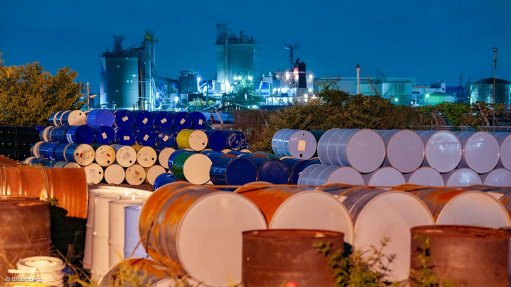Blockchain can provide infrastructure for financial inclusion in Africa – Standard Bank
Given Africa's rapid commercial growth and globalisation over the past decade, innovation in financial technology (fintech), and particularly blockchain technology, can drive improvement of financial infrastructure.
The necessity for more inclusive financial services has been firmly established. To address the unique challenge of providing the large portion of the African population that remains unbanked with more accessible tools for financial management and inclusion, Standard Bank and others have been researching and developing transformative fintech and blockchain products, says Standard Bank head of blockchain Ian Putter.
"The real potential for exponential leaps in financial inclusion lies in the blockchain infrastructure that underpins cryptocurrencies, rather than in the currencies themselves. One of the most powerful aspects of blockchain is the ability to create programmable money, that can assist to eliminate fraud and human error in transactions, and foster transparency in financial records.
"This aspect of the blockchain can enable the creation of corruption-resistant and robust welfare systems, ensuring social welfare efforts reach their intended beneficiaries and meet priorities like ensuring that those in need are assisted and treated with dignity," he says.
For example, blockchains that enable smart contracts, which is a computer program that requires conditions to be met before executing a transaction, may be used to verify an individual's eligibility to receive a grant, and then pay the recipient directly into a digital wallet on their smartphone.
Among the use cases for fintech in Africa are peer-to-peer payments, which are widely used to enable the informal and small business ventures at the beating heart of many African economies, as well as easing the logistics and cost of remittances.
"The continued globalisation of African markets has resulted in a need for more efficient and lower-cost cross-border payments to facilitate African businesses conducting trade abroad.
“Countries like South Africa, Kenya, Nigeria and Ghana have seen a rapid uptake of cryptocurrencies as a means to access more efficient payment rails provided by blockchain networks, and yield returns on income with assets like Bitcoin or stable coins pegged to the value of the dollar," Putter says.
Further, blockchains can also provide mechanisms for fair and transparent microfinance and increased purchasing power, to support the creation and growth of small enterprises that serve communities.
Transparent social coordination tools afforded by blockchain-based organizational entities, like decentralised autonomous organisations, can empower small business collectives to gain access to competitive advantages like negotiating power to match larger businesses.
"The shift in African markets is taking place as a grassroots and collaborative transformation. Building financial literacy, education and awareness at the level of communities and providing tools to help communities empower themselves is a priority for us.
"Standard Bank remains at the forefront of research and development of blockchain and distributed ledger technology in the African context, committed to the exploration of efficient digital payment rails and financial services that enable African commerce to flourish. This includes ongoing collaboration with major blockchain companies, like Algorand and Hedera.
"Improving the inclusion of the underserved is a core value of Standard Bank, and blockchain technology will no doubt provide an avenue for great impact on African markets in the coming years," says Putter.
Comments
Press Office
Announcements
What's On
Subscribe to improve your user experience...
Option 1 (equivalent of R125 a month):
Receive a weekly copy of Creamer Media's Engineering News & Mining Weekly magazine
(print copy for those in South Africa and e-magazine for those outside of South Africa)
Receive daily email newsletters
Access to full search results
Access archive of magazine back copies
Access to Projects in Progress
Access to ONE Research Report of your choice in PDF format
Option 2 (equivalent of R375 a month):
All benefits from Option 1
PLUS
Access to Creamer Media's Research Channel Africa for ALL Research Reports, in PDF format, on various industrial and mining sectors
including Electricity; Water; Energy Transition; Hydrogen; Roads, Rail and Ports; Coal; Gold; Platinum; Battery Metals; etc.
Already a subscriber?
Forgotten your password?
Receive weekly copy of Creamer Media's Engineering News & Mining Weekly magazine (print copy for those in South Africa and e-magazine for those outside of South Africa)
➕
Recieve daily email newsletters
➕
Access to full search results
➕
Access archive of magazine back copies
➕
Access to Projects in Progress
➕
Access to ONE Research Report of your choice in PDF format
RESEARCH CHANNEL AFRICA
R4500 (equivalent of R375 a month)
SUBSCRIBEAll benefits from Option 1
➕
Access to Creamer Media's Research Channel Africa for ALL Research Reports on various industrial and mining sectors, in PDF format, including on:
Electricity
➕
Water
➕
Energy Transition
➕
Hydrogen
➕
Roads, Rail and Ports
➕
Coal
➕
Gold
➕
Platinum
➕
Battery Metals
➕
etc.
Receive all benefits from Option 1 or Option 2 delivered to numerous people at your company
➕
Multiple User names and Passwords for simultaneous log-ins
➕
Intranet integration access to all in your organisation

















